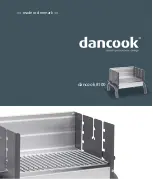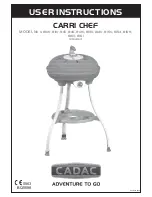
11
English
• Reduce pressure on the drill just before the bit breaks through the workpiece to avoid splintering the wood.
(
Note
: Clamping a backing block to the workpiece will keep the back of the wood from splintering. If not
using a backing block when using spade bits and hole saws, reduce pressure as soon as the bit point breaks
through the workpiece and complete drilling the hole from the opposite side.)
DRILLING IN METAL
Important Note
:
use good quality high-speed steel twist drill bits.
• With the drill unplugged, install the bit and perform the pre-drilling checks as stated in the preceding wood
drilling section.
• To make starting the hole easier and keep the bit from “walking” on the workpiece, use a center punch to
make a small impression in the metal. Place the drill bit tip into the impression and start the drill by slowly
depressing the switch trigger. Apply only enough pressure to keep the bit cutting into the metal.
WARNING:
DO NOT FORCE the tool. Too much pressure may cause bits
to break, resulting in bodily injury. Excessive pressure will cause bits to overheat,
damaging the drill bit. Too little pressure keeps the bit from cutting, dulling the bit
edges due to excessive friction.
• If drilling large holes, first drill a smaller hole and then enlarge it to the desired size.
• using lubricants such as oil on the point will help cool the bit, increase drilling action and extend drill bit life.
• Clamp a backing block to the workpiece to prevent binding and distortion when the bit breaks through the
metal.
MAINTENANCE
CLEANING
Avoid using solvents when cleaning plastic parts. Most plastics are susceptible to damage from various types of
commercial solvents and may be damaged by their use. use clean cloths to remove dirt, dust, oil, grease, etc.
WARNING:
Do not at any time let brake fluids, gasoline, petroleum-based
products, penetrating oils, etc., come in contact with plastic parts. Chemicals can
damage, weaken or destroy plastic which may result in serious personal injury.
electric tools used on fiberglass material, wallboard, spackling compounds, or plaster are subject to accelerated
wear and possible premature failure because the fiberglass chips and grindings are highly abrasive to bearings,
brushes, commutators, etc. Consequently, we do not recommended using this tool for extended work on these
types of materials. However, if you do work with any of these materials, it is extremely important to clean the tool
using compressed air.
LUBRICATION
This tool is permanently lubricated at the factory and requires no additional lubrication.












































